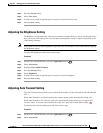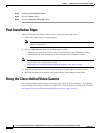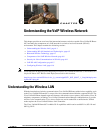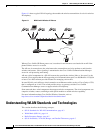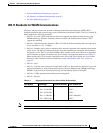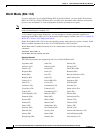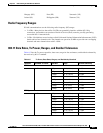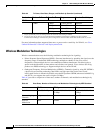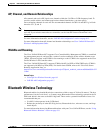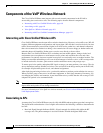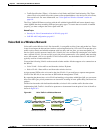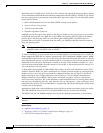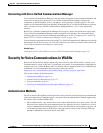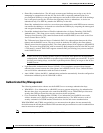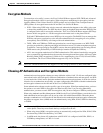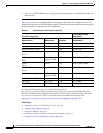
6-7
Cisco Unified IP Phone 8961, 9951, and 9971 Administration Guide for Cisco Unified Communications Manager 8.5 (SIP)
OL-20861-01
Chapter 6 Understanding the VoIP Wireless Network
Bluetooth Wireless Technology
AP, Channel, and Domain Relationships
APs transmit and receive RF signals over channels within the 2.4 GHz or 5 GHz frequency band. To
provide a stable wireless environment and reduce channel interference, you must specify
non-overlapping channels for each AP. The recommended channels for 802.11b and 802.11g in North
America are 1, 6, and 11.
Note In a non controller-based wireless network, it is recommended that you statically configure channels for
each AP. If your wireless network uses a controller, use the Auto-RF feature with minimal voice
disruption.
For more information about APs, see the “VoIP WLAN Configuration” section on page 6-15.
For more information about AP, channel and domain relationships, see Cisco Unified IP Phone 9971
Wireless LAN Deployment Guide.
WLANs and Roaming
The Cisco Unified IP Phone 9971 supports Cisco Centralized Key Management (CCKM), a centralized
key management protocol, and provides a cache of session credentials on the wireless domain server
(WDS). APs must register to the WDS for fast roaming to work. CCKM is also supported on the Cisco
Unified Wireless LAN Controller alone.
The Cisco Unified IP Phone 9971 supports CCKM with 802.1x+WEP or WPA(TKIP) only. CCKM is
not supported with WPA2 or WPA(AES). For details about CCKM, refer to the “Cisco Fast Secure
Roaming Application Note” at:
http://www.cisco.com/en/US/products/hw/wireless/ps4570/prod_technical_reference09186a00801c522
3.html
Related Topics
• Voice QoS in a Wireless Network, page 6-9
• VoIP WLAN Configuration, page 6-15
Bluetooth Wireless Technology
Bluetooth enables low bandwidth wireless connections within a range of 30 feet (10 meters). The best
performance is in the 3-to 6-foot (1- to 2-meter) range. Bluetooth wireless technology operates in the 2.4
GHz band which is the same as the 802.11b/g band. There can be a potential interference issues. It is
recommended that you:
• Use 802.11a that operates in the 5 GHz band.
• Reduce the proximity of other 802.11b/g devices, Bluetooth devices, microwave ovens, and large
metal objects.
For more information about using Bluetooth headsets with your Cisco Unified IP Phone, see the “Using
Bluetooth Wireless Headsets” section on page 3-8.



